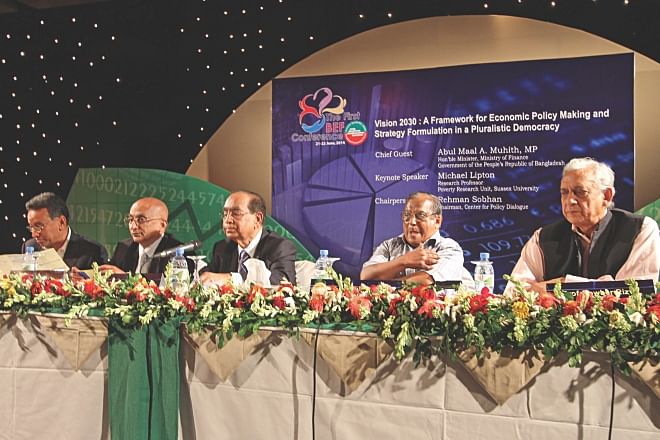Good governance: need of the time
Good governance: need of the time
Analysts show ways for higher economic growth

Bangladesh may not be able to scale up its economic growth and sustain development achievements without improving governance, which is deteriorating gradually, analysts said yesterday.
They also stressed consensus among political parties to improve governance and keep economic priorities unscathed.
"This is high time we reach political consensus on governance. It won't cost them (political parties) anything," said Akbar Ali Khan, a former finance adviser to the caretaker government.
Citing that Bangladesh's position is in the lowest quintile of global governance indices, he said governance is deteriorating at an unacceptable rate.
He also gave an example of Russia, which he said saw a huge economic growth initially, but could not sustain the growth later due to weak governance.
"We will have to face the same problem," he said, adding that good governance is also needed for ensuring fundamental human rights.
Khan spoke at a session of a conference organised by Bangladesh Economists Forum at Radisson Hotel in Dhaka.
He said there have been small reforms but these are inadequate. "There are areas where we need to be concerned and reforms are needed."
A paper on growth and development written by Prof Wahiduddin Mahmud was presented at the discussion.
Mahmud in his paper said question on how long Bangladesh can remain an outlier in the growth-governance nexus has surfaced given the steadily deteriorating governance ranking of the country.
"There are indications that institutional weakness may be reaching the tipping point beyond which they become binding growth constraints," Mahmud said.
HT Imam, political adviser to the Prime Minister, said sustained growth and development cannot be ensured without good governance.
BNP leader and former commerce minister Amir Khasru Mahmud Chowdhury criticised the government for loan scams in state banks which now require public money for recapitalisation. The country cannot have good governance without good institutions that can run effectively and independently, Chowdhury said. Gowher Rizvi, the foreign affairs adviser to the Prime Minister, said democracy is vital for sustainable and long-term development. "But good governance will not come overnight," Rizvi said.
He said the authority of the Anti-Corruption Commission has been restored. There should be consensus among political parties on how to take the Election Commission forward.
At another session, Mohammed Farashuddin, a former governor of Bangladesh Bank, also called for consensus among political parties on broader economic issues.
Mohiuddin Alamgir, former president of Bangladesh Economic Association, said rules and regulations already exist to ensure good governance but these are not being implemented. He stressed increasing credibility of state institutions. "When politicisation of civil services is rampant then you have a problem."
AB Mirza Azizul Islam, another former adviser to the caretaker government, said there are no differences between the two major political parties as both focus on the private sector-led economic growth.
He suggested prioritising investment to give a boost to infrastructure, energy and power, healthcare, education, safety nets and food security. "We must strengthen government institutions to ensure proper delivery of public services and reduce corruption," he said.